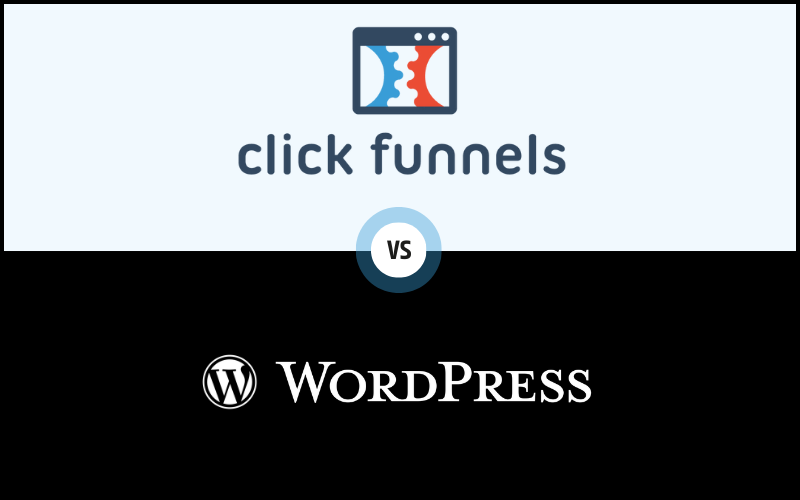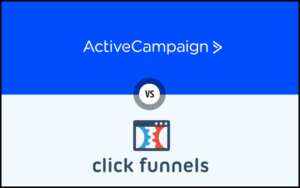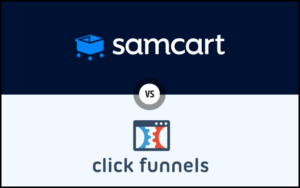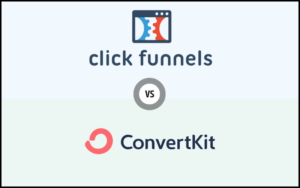Navigating the digital landscape requires a sturdy platform from which to launch your online endeavors, and the ClickFunnels vs WordPress decision is a pivotal one that many online creators and marketers face. This detailed guide explores the WordPress vs ClickFunnels debate, offering a side-by-side evaluation of two powerhouse platforms in the world of online business and web development. As we journey through the intricacies of ClickFunnels vs WordPress, we will closely examine which platform may best serve your digital strategy, emphasizing their unique offerings and how they can fulfill your specific needs.
ClickFunnels emerges as a specialized, conversion-focused tool, designed to streamline the process of building sales funnels and optimizing marketing campaigns. It offers a suite of integrated solutions aimed at maximizing user engagement and driving sales. As we dissect ClickFunnels vs WordPress, we’ll delve into how ClickFunnels can potentially accelerate your path to online profitability and customer conversion.
Contrastingly, WordPress presents itself as a robust content management system, renowned for its extensive customization capabilities and control. In discussing ClickFunnels vs WordPress, it’s clear that WordPress is the go-to for those who require a comprehensive digital presence with the ability to grow and evolve. Through WordPress, users gain access to a vast repository of themes and plugins, making it a formidable contender in the ClickFunnels vs WordPress comparison.
Throughout this exploration of ClickFunnels vs WordPress, we will touch upon several critical considerations such as ease of use, e-commerce integration, marketing tools, and scalability—all through the lens of ClickFunnels vs WordPress. This guide aims to not only elevate the keyword ‘ClickFunnels vs WordPress’ within the SEO realm but also to encapsulate the core functionalities and advantages each platform holds.
As we conclude our WordPress vs ClickFunnels analysis, you will be equipped with knowledge about which platform could best suit your business model, whether you’re launching a new venture or scaling an existing operation. The ClickFunnels vs WordPress debate is more than a choice between tools; it’s about selecting a partner in growth and success for your online business. With each mention of ClickFunnels vs WordPress, we’ll provide clarity and direction, ensuring that by the article’s end, the optimal path for your online journey is not just understood but illuminated.
Table of Contents
Ease of Use – ClickFunnels vs WordPress
When it comes to choosing between WordPress vs ClickFunnels, understanding the ease of use of each platform is crucial. This comparison, focused on “ClickFunnels vs WordPress,” aims to provide clear insights into how user-friendly and accessible these tools are, especially for beginners.
ClickFunnels: A Streamlined Approach
ClickFunnels is designed with simplicity and efficiency in mind. It caters to users who want a quick and straightforward way to create sales funnels without a steep learning curve. Here’s why it stands out for ease of use:

- Intuitive Interface: ClickFunnels boasts a drag-and-drop interface that makes it easy to set up pages and funnels, even for those with no technical background.
- Pre-built Funnels: It offers a variety of pre-designed funnel templates that cater to different business needs, enabling users to launch campaigns rapidly.
- Minimal Setup: With ClickFunnels, there’s less worry about hosting, plugins, or compatibility issues, as it’s a self-contained platform.
WordPress: Versatile but Complex
WordPress, in contrast, is known for its versatility and wide range of customization options. However, this flexibility comes with a complexity that can be challenging for beginners:

- Customization Freedom: WordPress allows for extensive customization through themes and plugins, offering endless possibilities for website design and functionality.
- Learning Curve: The platform requires a basic understanding of website management, and users often need to acquaint themselves with concepts like hosting, plugins, and theme updates.
- Community Support: The vast WordPress community provides extensive resources and tutorials, which can be incredibly helpful but also overwhelming for new users.
Conclusion
In the “ClickFunnels vs WordPress” debate regarding ease of use, ClickFunnels takes the lead for those seeking a more straightforward, user-friendly solution. On the other hand, WordPress, while more complex, offers greater control and customization for those willing to navigate its steeper learning curve. The choice depends on your comfort with technology and the specific needs of your online presence.
Customization Capabilities – ClickFunnels vs WordPress
When evaluating “ClickFunnels vs WordPress” in terms of customization capabilities, it’s important to understand how each platform caters to the diverse needs of users seeking to personalize their online presence.
ClickFunnels: Streamlined Customization
ClickFunnels is primarily designed for building sales funnels, and its customization features reflect this focus:
- Template-Based Design: It offers a range of pre-designed templates that users can customize to a certain extent. This includes modifying text, colors, images, and basic layout elements.
- Ease over Depth: While customization options in ClickFunnels are user-friendly, they are somewhat limited compared to WordPress. The platform prioritizes ease of use and speed of setup over deep customization.
- Integrated Features: ClickFunnels integrates various marketing tools and services, allowing for a seamless experience but within a predefined framework.
WordPress: A World of Possibilities
WordPress, known for its flexibility, offers extensive customization capabilities:
- Themes and Plugins: With thousands of themes and plugins available, WordPress allows users to dramatically alter their site’s appearance and functionality. From simple blogs to complex e-commerce sites, the possibilities are vast.
- Full Control Over Design: Users have complete control over their site’s design, including layout, typography, and color schemes. Advanced users can even edit HTML, CSS, and PHP files for total customization.
- Scalability and Adaptability: WordPress can grow and adapt with your business, making it a suitable choice for websites that require regular updates and changes.
Conclusion
In the comparison of “ClickFunnels vs WordPress” regarding customization capabilities, WordPress undoubtedly leads for those who need a highly customizable and scalable platform. ClickFunnels, while more limited in customization, offers a streamlined, user-friendly experience ideal for users focused primarily on sales funnels. The decision between the two should be based on your specific needs for customization and the nature of your online project.
Write about your personal experience with both products. (Paragraph)
E-commerce Integration – ClickFunnels vs WordPress
Understanding the e-commerce integration capabilities is vital in the “ClickFunnels vs WordPress” comparison, especially for businesses looking to optimize their online sales.
ClickFunnels: Focused on Funnel-Based Selling
ClickFunnels is inherently designed for sales funnel creation, which impacts its approach to e-commerce:
- Built-In Sales Funnel Features: ClickFunnels comes with integrated features tailored for selling products and services online. This includes pre-built funnel options like sales pages, checkout pages, and upsell sequences.
- Payment Gateway Integration: It supports a variety of payment gateways, including Stripe, PayPal, and others, facilitating easy and secure transactions.
- Limited Product Range: While effective for funnel-based selling, ClickFunnels might not be the best choice for managing a large inventory or a complex e-commerce site.
WordPress with WooCommerce: A Comprehensive E-commerce Solution
WordPress, when paired with the WooCommerce plugin, becomes a full-fledged e-commerce platform:
- Extensive Customization: WooCommerce allows for extensive customization of your online store, including product displays, checkout processes, and customer management.
- Wide Range of Payment Gateways: It supports a vast array of payment solutions, including major ones like PayPal, Stripe, and even country-specific options.
- Scalability and Flexibility: WordPress with WooCommerce can scale from small boutique shops to large online stores, offering flexibility in inventory management, shipping options, and customer handling.
Conclusion
In the “ClickFunnels vs WordPress” debate for e-commerce integration, the choice hinges on your specific business needs. ClickFunnels is ideal for businesses focused on funnel-driven sales with a streamlined product range. In contrast, WordPress combined with WooCommerce offers a more comprehensive solution for those needing a versatile and scalable online store with extensive product inventories and complex e-commerce functionalities.
Marketing Tools and Integration – ClickFunnels vs WordPress
In this section, we delve into the comparison of “ClickFunnels vs WordPress” in the context of marketing tools and integration capabilities, a critical aspect for businesses aiming to enhance their online marketing efforts.
ClickFunnels: A Marketing-Focused Platform
ClickFunnels is engineered with marketing at its core, offering several integrated tools and features:

- Built-In Marketing Tools: ClickFunnels provides a range of in-built marketing tools designed for lead generation, email campaigns, and analytics. This integrated approach simplifies the process of tracking and optimizing marketing funnels.
- Ease of Integration: It allows seamless integration with popular marketing platforms like MailChimp, AWeber, and others, enabling users to enhance their marketing efforts without needing extensive technical know-how.
- Focus on Conversion: The platform is optimized for high conversion rates, with features like A/B testing, conversion tracking, and targeted upsells.
WordPress: Flexible but Requires More Setup
WordPress, known for its flexibility, offers a different approach to marketing tools and integration:

- Plugin-Based Extensions: WordPress allows users to integrate a wide array of marketing tools through plugins. Whether it’s SEO, social media marketing, or email campaigns, there’s almost always a plugin available.
- SEO-Friendly: With plugins like Rank Math SEO, WordPress websites can be optimized for search engines, which is crucial for online visibility and traffic.
- Diverse Integration Options: The open-source nature of WordPress means it can integrate with virtually any third-party marketing tool or service, though this often requires more setup and customization than ClickFunnels.
Conclusion
In the “ClickFunnels vs WordPress” comparison for marketing tools and integration, the choice depends on your specific needs and technical expertise. ClickFunnels offers an all-in-one solution with integrated marketing tools ideal for businesses focused on funnel-based marketing and sales. On the other hand, WordPress, with its vast array of plugins, provides a more customizable and versatile platform but requires more effort to set up and manage.
Performance and Speed – WordPress vs ClickFunnels
Evaluating the performance and speed is a crucial aspect in the ClickFunnels vs WordPress debate, particularly since these factors significantly impact user experience and SEO.
ClickFunnels: Optimized for Speed and Efficiency
ClickFunnels is built to offer optimized performance, especially in the context of sales funnels:
- Hosted Solution: Being a hosted platform, ClickFunnels handles all the technical aspects of web hosting, ensuring generally consistent and reliable performance.
- Page Loading Speed: The platform is optimized for fast loading times, a key factor for keeping potential customers engaged and reducing bounce rates.
- Limited Customization Impact: Since customization options are more controlled, the impact on speed is typically less pronounced compared to a highly customized WordPress site.
WordPress: Dependent on Hosting and Customization
The performance of a WordPress site can vary greatly based on hosting and the level of customization:
- Hosting Dependent: WordPress site speed largely depends on the quality of the hosting service. A high-quality host can significantly boost site performance.
- Theme and Plugin Impact: The chosen theme and plugins can greatly affect site speed. Heavily customized sites with numerous plugins may experience slower loading times.
- Optimization Required: Regular maintenance and optimization, such as caching, image optimization, and plugin management, are essential for maintaining optimal performance.
Conclusion
In the ClickFunnels vs WordPress comparison for performance and speed, ClickFunnels offers a more consistent experience out-of-the-box, ideal for users who prefer a hands-off approach. WordPress, while potentially more powerful, requires careful management of hosting, themes, and plugins to achieve optimal performance. The decision should align with your technical expertise and the level of control you desire over your site’s performance.
Support and Community – ClickFunnels vs WordPress
In the comparison of ClickFunnels vs WordPress, examining the support and community aspects is essential, as these resources can greatly influence user experience and problem-solving capabilities.
ClickFunnels: Dedicated Support and Exclusive Community
ClickFunnels provides a structured support system and a unique community environment:

- Customer Support: ClickFunnels offers dedicated customer support through various channels like email, live chat, and a ticket system. This direct support is beneficial for quick and specific issue resolution.
- Focused Community: The platform has an exclusive community, especially in forums and social media groups, where users can share strategies, tips, and success stories. This community is particularly focused on sales funnels and online marketing.
- Learning Resources: ClickFunnels also provides a wealth of learning materials, including webinars, tutorials, and a knowledge base, helping users maximize their use of the platform.
WordPress: Extensive Community and Diverse Support Options
WordPress, being an open-source platform, has a different approach to support and community:

- Community Support: The WordPress community is vast and diverse, with forums, social media groups, and blogs offering assistance and advice. However, the support is community-driven and not officially regulated.
- Plugin and Theme Developers: For specific issues related to plugins or themes, support can often be sought directly from the developers of these tools.
- Abundance of Resources: There is an abundance of learning resources available online for WordPress, from tutorials and online courses to blogs and YouTube channels. However, finding the right solution can sometimes be like searching for a needle in a haystack due to the sheer volume of information.
Conclusion
In the ClickFunnels vs WordPress debate regarding support and community, ClickFunnels offers more streamlined and direct support, beneficial for users who want quick solutions and a community focused on funnel-building. WordPress, on the other hand, has a far larger and more diverse community, offering a wealth of resources and peer support, which is ideal for those who appreciate a vast network of knowledge and are comfortable with self-guided learning.
Scalability – ClickFunnels vs WordPress
In the context of “ClickFunnels vs WordPress,” understanding each platform’s scalability is crucial for businesses planning for growth and expansion.
ClickFunnels: Optimized for Scale in Sales Funnel Creation
ClickFunnels, as a sales funnel builder, offers specific scalability features:
- Streamlined Scaling: ClickFunnels is designed to efficiently scale your marketing and sales efforts. As your business grows, adding new funnels and scaling up your marketing campaigns is straightforward.
- Performance at Scale: The platform maintains performance even as you increase your sales funnels, ensuring a consistent user experience.
- Plan Limitations: It’s important to note that ClickFunnels has plan limitations, like the number of funnels and pages you can create, which might require upgrading your plan as you scale.
WordPress: Highly Scalable with Broad Flexibility
WordPress provides extensive scalability options, catering to a wide range of websites:
- Adaptable to Diverse Needs: Whether you’re running a small blog or a large e-commerce site, WordPress can adapt to your changing needs. Its extensive range of plugins and themes makes it suitable for almost any type of website.
- Control Over Scalability: You have complete control over your site’s scalability, from choosing hosting solutions that can handle increased traffic to selecting plugins that optimize performance.
- Technical Considerations: Scaling a WordPress site can require technical expertise, particularly when customizing and optimizing the site for high traffic and complex functionalities.
Conclusion
When considering “ClickFunnels vs WordPress” for scalability, the choice depends on your specific needs and technical capabilities. ClickFunnels offers a more straightforward path to scaling sales funnels, ideal for businesses focused on direct marketing and sales conversions. WordPress, with its flexibility and vast range of options, provides a more customizable platform capable of scaling to a wide variety of business types and sizes, though it may require more technical oversight.
Pricing and Value for Money – ClickFunnels vs WordPress
When assessing “ClickFunnels vs WordPress” in terms of pricing and value for money, it’s important to look at what each platform offers for their cost.
ClickFunnels – Pricing
ClickFunnels offers a tiered pricing structure that is straightforward:

- Basic Plan: Priced at $127/month when billed annually, this plan includes 1 website, 20 funnels, 3 users, and support for up to 10,000 contacts.
- Pro Plan: At $157/month with annual billing, you get more capacity with 1 website, 100 funnels, 5 users, and up to 25,000 contacts.
- Funnel Hacker Plan: The most extensive plan costs $208/month annually and caters to larger businesses with 3 websites, unlimited funnels, 15 users, and support for up to 200,000 contacts.
Each tier offers unlimited courses, pages, workflows, and products, with the higher tiers providing additional features like API access and increased contact limits. The annual discount provides significant savings, positioning ClickFunnels as a robust, though premium-priced, all-in-one marketing solution.
WordPress – Pricing
WordPress.com offers a range of plans, from free to enterprise-level, each with its own set of features:

- Free Plan: It’s free, providing basic WordPress functionality with unlimited pages and users.
- Starter Plan: At $4/month, billed annually, this plan includes a free domain for one year and removes WordPress ads.
- Pro Plans: Ranging from $8 to $45/month, these plans offer advanced features like premium themes, live chat support, and the ability to earn money through ads.
- Enterprise Plan: Custom-priced, it is designed for large businesses requiring top-notch performance and support.
WordPress plans offer incremental storage increases from 1GB to 50GB as you move up tiers, and the paid plans offer advanced SEO, backup, and security features. Notably, WordPress’s pricing is typically more affordable, but it can increase with additional plugin or theme purchases and the need for professional development.
Conclusion
In the comparison of ClickFunnels vs WordPress for pricing and value for money, ClickFunnels offers a more comprehensive package for users who require integrated marketing tools and sales funnel creation out of the box. In contrast, WordPress provides a more cost-effective solution with the flexibility to add features as needed, which can be ideal for businesses that are growing incrementally and those with tighter budgets. The choice depends on the specific needs of your business and how much value you place on ease of use, integrated marketing tools, and scalability.
Conclusion: Who is the winner?
Navigating the “ClickFunnels vs WordPress” decision is pivotal for entrepreneurs, business owners, and digital marketers seeking to establish a robust online presence. Each platform serves distinct needs and offers unique benefits, and your choice will significantly influence the trajectory of your online venture.
Deciding Factors
To determine which platform is right for you, consider the following key factors:
- Purpose and Functionality: If your primary goal is to build high-converting sales funnels with ease and speed, ClickFunnels is tailored for this purpose. WordPress, however, is a versatile choice if you’re aiming for a content-rich site with extensive customization and a wide array of features.
- Technical Expertise: ClickFunnels provides a more user-friendly experience for those with limited technical skills, while WordPress may require a steeper learning curve or the assistance of a developer for complex sites.
- Budget Constraints: Evaluate the cost against the value you expect to derive from each platform. ClickFunnels may have a higher upfront cost, but it includes marketing tools that could otherwise add to WordPress expenses.
- Growth and Scalability: Consider how each platform will accommodate your growth. WordPress is highly scalable with the right hosting and technical adjustments, whereas ClickFunnels offers scalability within the confines of funnel creation.
Final Thoughts
Both ClickFunnels and WordPress are powerful platforms, each with the potential to be the cornerstone of a successful online business. ClickFunnels shines with its specialized approach to sales funnels and marketing, providing an all-in-one package that can get you up and running quickly. WordPress, on the other hand, offers a broader scope for website creation, with the flexibility to build anything from a simple blog to an advanced e-commerce site.
Ultimately, the decision comes down to aligning the platform’s capabilities with your business objectives, technical comfort level, and long-term digital strategy. Whether you choose ClickFunnels for its targeted marketing efficiency or WordPress for its expansive potential, both platforms can serve as a launchpad for your online success.
If you found this article helpful, feel free to check out our other articles such as “Builderall vs ClickFunnels,” “Unbounce vs ClickFunnels,” “Shopify vs Amazon,” “SamCart vs ClickFunnels,” or any of the articles listed down bellow.






Pingback: ClickFunnels vs ConvertKit: Elevate Your Marketing Strategy in 2024 - The Insight Corridor
Pingback: Unbounce vs ClickFunnels: The Ultimate Showdown for Conversion Optimization in 2024 - The Insight Corridor
Pingback: Clickfunnels vs Shopify 2023 - Which is best for E-Commerce
Pingback: Shopify vs Amazon: A Seller's Guide to Choosing the Perfect E-commerce Platform in 2024 - The Insight Corridor
Pingback: Builderall vs ClickFunnels: Optimizing Your Online Strategy for Success in 2024 - The Insight Corridor